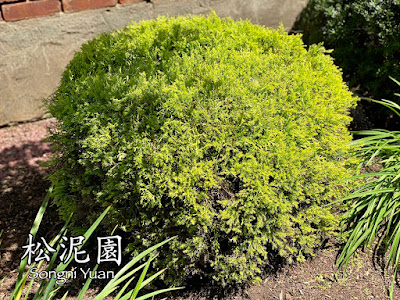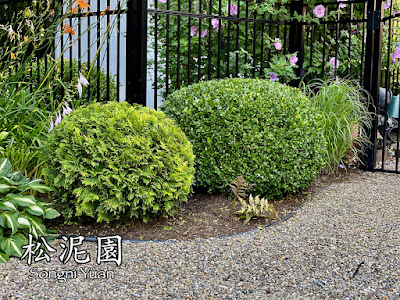The Japanese maple in the Zen garden usually drops all it leaves and color by now, but this year the leaves seem to be about a week later.
Sunday, October 31, 2021
Halloween Surprise
Monday, August 30, 2021
Walk The Line
I wanted to share some of the progress that has occurred in the new viewing and stroll gardens. The fence has certainly improved the appearance, but the plants in this are area doing very well.
Adding fresh mulch helped with moisture retainment, and the large amounts of rainfall we experienced this summer also helped. Normally the soil here is very poor and sandy. Regardless, some of the plants have finally taken to the soil.
 |
| The Scotch Pine Pom Pom (Pinus sylvestris) looks great. |
 |
| The Blue Star Juniper is looking healthy after several years of doing very poorly. |
 |
| The Mikawa yatsubusa Japanese Maple, a bit thinned, but holding up well to its transplant. |
 |
| The Panicum Virgatum 'Ruby Ribbons' has grown substantially since it was first transplanted to this location. It looks wonderful with the fence in the background. |
 |
| The hardscape and lantern also accentuate the 'Ruby Ribbons.' |
 |
| The Super Blue Liriope (Liriope mascara 'Super Blue') is thriving along the edges. |
 |
| The Japanese Forest Grass 'Aureola' (Hakonechloa macra 'Aureola') along the new fence has filled in nicely. |
 |
| A stray Japanese Painted Fern (Athyrium niponicum 'Pictum' anchors a "mountain" with the fence as backdrop. |
Wednesday, August 25, 2021
Finding Peace
Thirty SevenA superior person cares for the well-being of allthings.She does this by accepting responsibility for the energyshe manifests, both actively and in the subtle realm.Looking at a tree, she sees not an isolated event, butroot, leaves, trunk, water, soil and sun: each eventrelated to the others, and "tree" arising out of theirrelatedness.Looking at herself or another, she sees the same thing.Trees and animals, humans and insects, flowers andbirds:These are the active images of the subtle energies that flowfrom the stars throughout the universe. Meetingand combining with each other and the elements ofthe earth, they give rise to all living things.The superior person understands this, and understandsthat her own energies play a part in it.Understanding these things, she respects the earth asher mother, the heavens as her father, and all livingthings as her brothers and sisters.Caring for them, she knows that she cares for herself.Giving to them, she knows that she gives to herself.At peace with them, she is always at peace with herself.By Lao TsuTranslated by Brian Walker
Tuesday, August 24, 2021
Enter the Light
I decided to add a couple more lights to the garden in the form of gate lanterns. Initially, I used an older lantern I already had that required a candle. However, out of laziness, I decided that I wanted some sort of solar powered lantern that didn't require my constant attention.
After searching the web for a long time I eventually settled on the following lanterns. The lights are simple LED string lights with a solar cap.
Sunday, August 22, 2021
Moon With Shadows Plays
Tuesday, August 17, 2021
Litynski 2.0
Back in June, 2021 I bought an Icebreaker Korean Fir (Abies koreana 'Ice Breaker') and attempted to plant what I hoped would be an unusual and interesting addition to the garden.
I thought it might have been slugs, but they were only creating minimal damage. I also speculated that it might have something to do with the never ending rain we had throughout July. It could also have been that it wasn't suited for this zone and climate. I will never really know.
Fortunately the nursery I purchased it from honored their warranty on plants and refunded my full costs. I was then left with the decision to find a replacement for "The Litynski."
Ultimately, I decided on something safe. I transplanted a small Green Velvet Boxwood (Buxus 'Green Velvet') that had been located in the Dragon's Spine.
 |
| Front, Right Was Moved |
Back in 2017 I was hoping this plant, along with a companion, would merge into a larger adjacent Boxwood. It never turned out the way I expected, so I decided moving it was an easy and cheap way of finding a solution to my current problem.
The Boxwood isn't as interesting as the Fir, but it is reliable and will do well in this location. I also like that its a slow grower, so it won't overwhelm this location in my lifetime.
Most importantly, I believe the Boxwood should be named. As a result, I am calling it the "Litynski 2.0." Overtime it will add interest to the garden, especially in the winter since it is an evergreen.
Friday, August 13, 2021
Barberry Bonsai
While reworking all of the shrubs in the bed in front of the house, I decided to convert a Barberry Shrub to a Bonsai.
 |
| House front, 2018. Barberry is the shrub between two Spirea, just below and between the rocking chairs. |
The shrub was planted more than 15 years ago. The light in this area was minimal, so over the years the shrub continued to grow very slowly. As it did so, its branched reacher further and further out from the core of the trunk in an attempt to grab some of the light that saturated the area just in front of the shrub along the walkway.
 |
| Barberry, far right of picture after trimming. |
This summer I began to remove most of the overgrown shrubs. The plan was to replace them with grasses (sun) and bamboo (shady). Doing so would be better for dealing with large snow loads coming off the house each winter, especially after getting three feet of snow in one day last year.
 |
| Cyprus before removal. |
 |
| Cyprus after removal. |
 |
| Barberry after initial trimming. It had reached out beyond the walkway timber. |
At that point, I realized that I could easily turn it into a Bonsai. Its trunk was fantastically interesting.
After a couple of hours in which I trimmed the shrub back even further, I then dug it up, trimmed out the large unnecessary roots, and proceeded to wire the Barberry into the pot. Keep in mind, I watched several "Bonsai-How-to" videos online before I undertook this experiment.
 |
| Bonsai Front |
 |
| Bonsai Back |
When finished, the Barberry looked sort-of like a "real" Bonsai.
I'm hoping it survives the transplant. If it does I have a great looking plant for the garden. If it doesn't, I retired a shrub that needed to go.
Tuesday, August 10, 2021
Such a Fair Maiden
I had the opportunity to visit Stone Crop Gardens this summer, the former estate of Anne and Frank Cabot (who founded The Garden Conservancy). Stone Crop has a wonderful series of gardens. While strolling through the woodland gardens, I came across a significant amount of Maidenhair Ferns. These ferns are native to eastern North America, and can be found throughout New York. I loved the thin black stems and the leaf structure.
 |
| Maidenhair Ferns at Stone Crop |
Seeing them in such abundance at Stone Crop was a wonderful experience.
So, I decided to ad a couple Maidenhair ferns (Adiantum pedatum) to the garden to see what might happen. The soil, water, and shade requirements are perfect for my garden - rich, moist and shady.
I placed one in a gap near Buddha, and the other along the fence line where another plant has been recently eaten by rabbits.
Friday, July 23, 2021
Beware the Shrubs
 |
| Japanese Yew |
 |
| Rheingold Arborvitea (Thuja occidentalis ‘Rheingold’) |
 |
| Green Velvet Boxwood (Buxus 'Green Velvet') |
 |
| 'Europa Gold' arborvitae (thuja occidentalis) |
 |
'Europa Gold' arborvitae (thuja occidentalis); The Japanese Boxwood (Buxus microphylla var. Japonica) |
 |
| Green Velvet Boxwood (Buxus 'Green Velvet') |
 |
| Spirea japonica |
 |
| Spirea japonica |
 |
| Spiraea japonica 'Alpina' (Japanese Spirea - aka 'Nana') |
 |
Rheingold Arborvitea (Thuja occidentalis ‘Rheingold’) - center; Spirea japonica - left/right |
 |
| Spirea japonica |
 |
| Mr. Bolwing Ball Arborvitae (Thuja occidentalis 'Bobozam') |



























